|
|
|
Sort Order |
|
|
|
Items / Page
|
|
|
|
|
|
|
| Srl | Item |
| 1 |
ID:
168394


|
|
|
|
|
| Publication |
Malta, Mediterranean Academy of Diplomatic Studies, 2012.
|
| Description |
xlvi, 504p.pbk
|
| Standard Number |
9789995701765
|
|
|
|
|
|
|
|
|
|
|
|
Copies: C:1/I:0,R:0,Q:0
Circulation
| Accession# | Call# | Current Location | Status | Policy | Location |
| 059742 | 323.4/CAL 059742 | Main | On Shelf | General | |
|
|
|
|
| 2 |
ID:
121768


|
|
|
|
|
| Publication |
2013.
|
| Summary/Abstract |
Starting from the empirical distinction between 'discontented' and 'dispossessed' created by processes of accumulation by dispossession necessary for neoliberalism to succeed, this paper suggests how the broader historical-geographical framework developed by David Harvey helps us make sense of the 2011 Egyptian revolution. The paper focuses on the underlying tension between the ever more frequent encroachments of 'the molecular processes of capital accumulation in space and time' within the political sphere and the persisting relevance of forms of territorial government and governance for the success of capital accumulation itself. This seeming contradiction allows us to account both for the penetration of neoliberalism in Egypt and for the different forms of hybridisation and domestication that accompanied it. It suggests that, by looking at the social consequences of neoliberalism, one can see a sharp class polarisation, with the emergence of both a private capitalist oligarchy and embryonic forms of alliance between the dispossessed and the discontented, which had a central role in the 2011 revolution. This perspective also permits us to go beyond the dominant liberal narrative of the Arab Spring focusing on demands for freedom (horreya) and democracy (dimuqratya), recovering the neglected yet vital dimension of social justice ('adala igtimaya).
|
|
|
|
|
|
|
|
|
|
|
|
|
|
|
|
| 3 |
ID:
145627


|
|
|
|
|
| Summary/Abstract |
This article seeks to examine the dynamics of counter-revolution in Egypt following the January 2011 revolution and their corresponding impact on the path of democratization in post-Mubarak Egypt. It argues that the popular calls for change that followed the Egyptian revolution have fallen repeatedly and quickly into the hands of a structural alliance of reactionary and constancy-oriented actors operating at the internal and external levels. These included the Egyptian Supreme Council of the Armed Forces (SCAF), the Muslim Brotherhood, and the United States with its intrusive global structure, all of which have emerged as agents of continuity and counter-revolution in post-Mubarak Egypt, in turn complicating any proposed genuine democratic transition.
|
|
|
|
|
|
|
|
|
|
|
|
|
|
|
|
| 4 |
ID:
121619
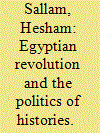

|
|
|
|
|
| Publication |
2013.
|
| Summary/Abstract |
The Arab "revolutions" and the events surrounding them have posed a variety of theoretical challenges to political scientists. Popular uprisings have resulted in the ouster of long-standing autocrats in Tunisia, Egypt, Libya, and Yemen, and are seriously threatening the survival of incumbent authoritarian rulers in a region that once seemed immune to democratic change (Brumberg 2002; Fish 2002; Heydemann 2007; Posusney and Angrist 2005; Salamé 1994; Schlumberger 2007). These unforeseen developments pushed scholars of politics back to the drawing board to revisit dominant theoretical understandings of the drivers of regime change and stability (Albrecht and Bishara 2011; Bellin 2012; Blaydes and Lo 2012; Brownlee and Stacher 2011; Droz-Vincent 2011; Gause 2011; Goldstone 2011; Hoffman and Jamal 2012, Lynch 2011; Masoud 2011; Stacher 2012).
|
|
|
|
|
|
|
|
|
|
|
|
|
|
|
|
| 5 |
ID:
107589
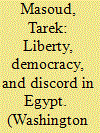

|
|
|
| 6 |
ID:
081118


|
|
|
|
|
| Publication |
Hampshire, Palgrave Macmillan, 2007.
|
| Description |
xi, 279p.hbk
|
| Standard Number |
9781403964311
|
|
|
|
|
|
|
|
|
|
|
|
Copies: C:1/I:0,R:0,Q:0
Circulation
| Accession# | Call# | Current Location | Status | Policy | Location |
| 053230 | 962.03/COL 053230 | Main | On Shelf | General | |
|
|
|
|
| 7 |
ID:
120015
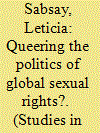

|
|
|
| 8 |
ID:
183763
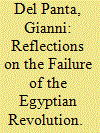

|
|
|
|
|
| Summary/Abstract |
Between January 2011 and July 2013, Egypt underwent a revolutionary period. While the roots and sequences of the Egyptian revolution have been studied comprehensively, much less has been said about the reasons behind the revolution’s defeat. The reason is twofold. On the one hand, scholars prevalently have explored democratization’s failure. On the other hand, the way in which Egyptian events were understood logically prevented the possibility of analyzing the 2011–2013 situation as an example of a failed revolution. By showing that the emergence of democracy was the most unlikely outcome and adopting an inter-social approach, the present article deals with the failure of social revolution in Egypt. In particular, it argues that the interaction between worldwide ideologies, epochal intellectual currents and (supposedly) successful contemporary revolutions on the one hand, and an internal context shaped by the legacies of Nasserism, the peculiar fate of the communist left and the institutional environment on the other, negatively affected the capacity of the subaltern classes even to outline an alternative political system. The non-emergence of popular bodies rendered unlikely the collapse of state apparatuses, making it impossible for revolutionaries to take power by extra-constitutional means and determining the defeat of the revolution
|
|
|
|
|
|
|
|
|
|
|
|
|
|
|
|
| 9 |
ID:
140121
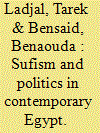

|
|
|
|
|
| Summary/Abstract |
Experts on Sufi movements relegate a rather significant and critical role for Sufism in the formation of redefined political forces on the new post-Arab Spring political map. This is particularly true for one of the most vibrant Sufi capitals of the Muslim world, Egypt, holding a record sum of more than 10 million Sufi members. In spite of this, however, one year after the Revolution in Egypt, political developments exhibited a pattern of failure of Sufis gaining political ground in the post-Mubarak political arena. This paper discusses contentions and problematic issues Sufis faced with respect to politics in Egypt, with particular focus given to their political experience in Egypt. This study seeks to explore the Sufi experience throughout the process of political struggle, while examining their contributions to the November 2011 elections in an attempt to unveil the factors culminating in their political setback in spite of their massive membership base, and the official favored support of the state, both on the local and international fronts. The study concludes that the nature of the Sufi practice itself contributed to a restraining of their political presence, in addition to their lack of political awareness, poor organization and populism, all of which acted critically toward creating a failed political journey for the Sufi orders in modern Egypt.
|
|
|
|
|
|
|
|
|
|
|
|
|
|
|
|
| 10 |
ID:
150957
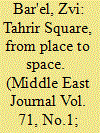

|
|
|
|
|
| Summary/Abstract |
Due to its role in the Egyptian Revolution, Tahrir Square in Cairo became synonymous with the Arab Spring. During the protests it was transformed from a physical place into a symbolic space and then into an abstract space. This article follows the stages of the square's transformation and aims to expose the implications that this transformation has on public discourse and on the political legitimacy that abstract spaces might bestow on regimes in general, and particularly in Egypt.
|
|
|
|
|
|
|
|
|
|
|
|
|
|
|
|
| 11 |
ID:
161093


|
|
|
|
|
| Summary/Abstract |
This article looks into the meaning of Tahrir Square before, during, and after the January 25 revolution. We employ Lefebvre's conceptual triad of space to understand how space is not merely a physical form, but also the product of relations between natural and social objects in this space. To understand how these relations changed dramatically after January 25, we will draw on Sewell's insight into how space is a constituent aspect of contentious politics. We discuss the way in which the political space of Tahrir Square went through distinct phases during and after the Egyptian revolution, from counter-space, to eventually a change in the conceived space of Tahrir Square, but not according to the principles of the newly created lived space during the 18 days.
|
|
|
|
|
|
|
|
|
|
|
|
|
|
|
|
| 12 |
ID:
130513


|
|
|
|
|
| Publication |
2011.
|
| Summary/Abstract |
Yet, despite the critical roles played by thousands of women during the revolution, female voices and women 's rights continue to be excluded from the emerging power structures and the national political agenda in silenced in post-Mubarak Egypt. Women, Nonviolent Action and the Cycle of Marginalization Nonviolent action, or civil resistance, is a civilian-based method of waging asymmetric conflict. It has been used in struggles for human rights.
|
|
|
|
|
|
|
|
|
|
|
|
|
|
|
|
|
|
|
|
|